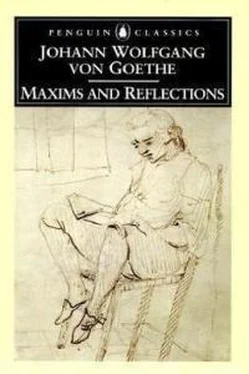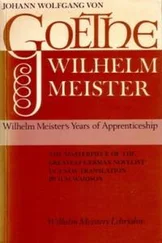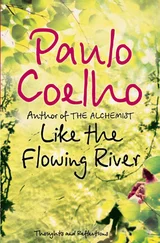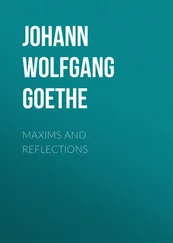Иоганн Гёте - Maxims and Reflections
Здесь есть возможность читать онлайн «Иоганн Гёте - Maxims and Reflections» весь текст электронной книги совершенно бесплатно (целиком полную версию без сокращений). В некоторых случаях можно слушать аудио, скачать через торрент в формате fb2 и присутствует краткое содержание. Год выпуска: 2015, Издательство: epubBooks Classics, Жанр: Публицистика, на английском языке. Описание произведения, (предисловие) а так же отзывы посетителей доступны на портале библиотеки ЛибКат.
- Название:Maxims and Reflections
- Автор:
- Издательство:epubBooks Classics
- Жанр:
- Год:2015
- ISBN:нет данных
- Рейтинг книги:5 / 5. Голосов: 1
-
Избранное:Добавить в избранное
- Отзывы:
-
Ваша оценка:
- 100
- 1
- 2
- 3
- 4
- 5
Maxims and Reflections: краткое содержание, описание и аннотация
Предлагаем к чтению аннотацию, описание, краткое содержание или предисловие (зависит от того, что написал сам автор книги «Maxims and Reflections»). Если вы не нашли необходимую информацию о книге — напишите в комментариях, мы постараемся отыскать её.
Maxims and Reflections — читать онлайн бесплатно полную книгу (весь текст) целиком
Ниже представлен текст книги, разбитый по страницам. Система сохранения места последней прочитанной страницы, позволяет с удобством читать онлайн бесплатно книгу «Maxims and Reflections», без необходимости каждый раз заново искать на чём Вы остановились. Поставьте закладку, и сможете в любой момент перейти на страницу, на которой закончили чтение.
Интервал:
Закладка:
For sixty years this essay has stood unquestioned in Goethe's works; but doubt has recently been cast on its authorship. The account hitherto given rests upon the excellent ground of Goethe's own declaration. The essay, it appears, was written about the year 1780, and offered to the Duchess Amalia. Some time after her death it was found amongst her papers, and sent to Goethe in May, 1828, when, as he wrote to his friend the Chancellor von Müller, he could not remember having composed it; although he recognised the writing as that of a person of whose services he used to avail himself some forty years previously. That at so great a distance of time a prolific author could not recall the composition of so short a piece is not, indeed, improbable; but Goethe proceeded to say that it agreed very well with the pantheistic ideas which occupied him at the age of thirty, and that his insight then might be called a comparative, which was thus forced to express its strife towards an as yet unattained superlative. Notwithstanding this declaration, the essay is now claimed as the production of a certain Swiss friend of Goethe's, by name Tobler, on external evidence which need not be examined here, and on the internal evidence afforded by the style, which is certainly more pointed and antithetic than is usual with Goethe. But a master of language who attempted every kind of composition may well have attempted this; and even those who credit an otherwise unknown person with the actual writing of the essay candidly admit that it is based upon conversations with Goethe. It is so clearly inspired with his genius that he can hardly be forced to yield the credit of it to another.
III
It is no wish or business of mine to introduce these maxims by adding one more to the innumerable essays, some of them admirable, which have been written on Goethe. I have found the translation of one of his works a harder and certainly a more profitable task than a general discourse on them all; and I profoundly believe that, rather than read what has been written on Goethe, it is very much better to read Goethe himself. It is in this belief that I hope the present translation may help in a small way to increase the direct knowledge of him in this country. But there are some remarks which I may be allowed to make on the nature and use of maxims, and the peculiar value of those of Goethe; so far, at least, as they deal with life and character and with literature. If Professor Huxley could be induced to publish the comments which he made to me as I read him the scientific maxims, besides being the best of introductions to that section of the book, they would form a keen and clear review of Goethe's scientific achievements, and an emphatic testimony to his wonderful anticipations of later theories.
Between a maxim, an aphorism, and an apophthegm, and in a more obvious degree, between these and an adage and a proverb, the etymologist and the lexicographer may easily find a distinction. But they are, one and all, fragments of the wisdom of life, treasured up in short, pithy sentences that state or define some general truth of experience; and perhaps with an adage and a maxim, enjoin its practice as a matter of conduct. In the literature of every age there have been writers who, instead of following a less severe method, thus briefly record the lessons taught them by a wide view of the doings of men; from the dim, far–off beginnings of Ptah Hotep the Egyptian to the authors of the Proverbs of Solomon and the Book of Wisdom, from Theognis and Plutarch downwards to our own time. They give us the shrewdest of their thoughts, detached from the facts which gave them birth. But the professed writers of maxims are not the only or always the best authors of them. There is no great writer who is not rich in wise sentences; where we have the advantage of seeing for ourselves the train of thought that induced and the occasion that called them forth. Terse and pregnant sayings are scattered innumerably through the pages of the finest poets, the great orators, philosophers, and historians, wherever they touch the highest level of truth and insight; be it in the lofty interpretation of life, the defence of action or policy, the analysis of character and conduct, or the record of progress; and then it is that large ideas and wide observations take on imperceptibly the nature of maxim or aphorism, illumining, like points of light, whole fields of thought and experience. And the test of their value is that they lose little or nothing by being deprived of their particular context and presented as truths of general import. A collection of proverbs, shrewd sayings, and pointed expressions, taken from the whole range of Greek and Latin literature, was made by the industry of Erasmus in his great folio of Adagia ; and perhaps some future student, as diligent as he, may gather up the aphoristic wisdom in the writings of modern times. Goethe himself has in all his great works a wealth of aphorism unsurpassed by any other writer whatever, even though it be Montaigne or Bacon or Shakespeare; and sayings of his not to be found in this collection are some of the best that he uttered.
The besetting sin of the maxim–writer is to exaggerate one side of a matter by neglecting another; to secure point and emphasis of style, by limiting the range of thought; and hence it is that most maxims present but a portion of truth and cannot be received unqualified. They must often be brought back to the test of life itself, and confronted and compared with other sides of the experience they profess to embody. And when a maxim stands this trial and proves its worth, it is not every one to whom it is of value. To some it may be a positive evil. It makes the strongest appeal to those who never see more than one aspect of anything, hardening their hearts and blunting their minds; and even to those who could make a good use of it, there are times when it may mislead and be dangerous. Maxims in their application seem to need something of the physician's art: they must be handled with care, and applied with discretion. Like powerful drugs they may act with beneficent effect on a hardy constitution; they may brace it to effort, or calm the fever of a misguided activity; but great is the mischief they work where the mind is weak or disorganised. As a medicine may save a man at one time that would kill him at another, so the wise counsel of to–day may easily become the poisonous suggestion of to–morrow.
With writers who depend for effect on mere qualities of style and ignore the weightier matters of depth and truth of observation, Goethe has nothing in common; nor with those who vainly imagine that insight is a kind of art, with a method that may be learned and applied. By constant practice a man of literary talent may, it is true, attain a fair mastery of language terse and attractive, and then set himself, if he will, to the deliberate creation of aphoristic wisdom or a philosophy of proverbs; mistaking the dexterous handling of a commonplace for the true process of discovery. The popular literature of the last generation supplies a terrible instance of the length to which the manufacture of maxims can thus be carried, for a time with immense success; and we have seen how a few years suffice to carry them and their author to obscurity. How different is the true process! The maxim that increases knowledge and enriches literature is of slow and rare appearance; it springs from a fine faculty of observation which is in no one's arbitrament, and only less rare than the gift of utterance which adds charm to a thought that itself strikes home with the power of impregnable truth. No amount or intensity of effort will alone produce it; but to the mind of genius it comes like a sudden revelation, flashing its light on a long course of patient attention. "What we call Discovery ," says Goethe, "is the serious exercise and activity of an original feeling for truth. It is a synthesis of world and mind, giving the most blessed assurance of the eternal harmony of things."
Читать дальшеИнтервал:
Закладка:
Похожие книги на «Maxims and Reflections»
Представляем Вашему вниманию похожие книги на «Maxims and Reflections» списком для выбора. Мы отобрали схожую по названию и смыслу литературу в надежде предоставить читателям больше вариантов отыскать новые, интересные, ещё непрочитанные произведения.
Обсуждение, отзывы о книге «Maxims and Reflections» и просто собственные мнения читателей. Оставьте ваши комментарии, напишите, что Вы думаете о произведении, его смысле или главных героях. Укажите что конкретно понравилось, а что нет, и почему Вы так считаете.








![Иоганн Гёте - Итальянское путешествие [litres]](/books/398657/iogann-gete-italyanskoe-puteshestvie-litres-thumb.webp)



